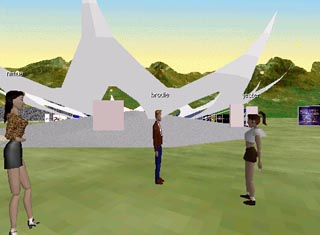AWABA - The Online Australia Virtual World
AWABA is a virtual reality project that has been developed by Online Australia to further the technological and creative skills of Australian students. This innovative project aims to encourage school students to become actively involved in the latest online technology and to promote imaginative Australian online culture.
Since AWABA was launched on 3 November it has been taken up enthusiastically by the Australian student community. Students from across the country, and often from regional and remote areas are now engaged in this virtual environment.
You enter AWABA at "ground zero" wearing a virtual body called an avatar. An avatar is important so that other people are able to see you. You can choose from a range of avatars - some of the more popular include a surfer dude, complete with surfboard, a boy on a motorbike and a seagul.
In the three weeks that it has been publicly available we have observed the development of an online community of students. Citizens of AWABA are getting to know each other, and are making friends. Trusted students with a good understanding of the programming environment are given priveliges to enable them to act as moderators and to help those struggling in the new environment. Other students have designated themselves as "helpers" and are enthusiastically advising others.

Reproduced with permission of Online Australia
An interesting development has been the decision by the AWABA community to create a Citizen's Council. The movement for a Citizen's Council is being led by a student of the Katherine School of the Air. He writes, "Citizens can approach members of the council and tell them of their ideas or of problems they have encountered." A Citizen's Council HQ is being built with a notice board highlighting issues and providing information on how to contact Council members.
There is lots of discussion amongst students about the need for a virtual currency. Do we want to see citizens allocated virtual money, on the basis of the amount of time they spend in AWABA, to allow them to purchase land and building materials, or is this just replicating the structures of the real world?
The last week has seen a building explosion, as students have learnt how to build and create objects in virtual space. Many have built their own houses, many like castles. There is amazing potential for creativity here. The houses reflect a wide range of designs - light and airy glassed-in spaces, disco spaces on the roof, interesting landscaping and furnishing. Designs are individual down to the choice of flooring material.
A virtual beach has been created and one citizen is taking advantage of the gull avatar to develop a "gull squadron" and is offering flying lessons to new recruits.
The word 'AWABA' is an aboriginal word meaning flat or plain surface. AWABA is a space where students can experiment, create and interact. AWABA is being demonstrated by it's creator at the Online Australia Internet Show this weekend.
